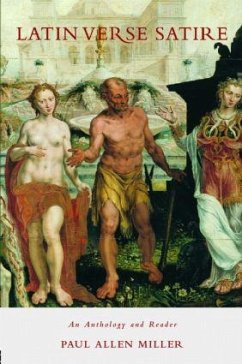
The Cambridge Companion to Roman Satire
Versandkostenfrei!
Versandfertig in 1-2 Wochen
102,99 €
inkl. MwSt.
Weitere Ausgaben:

PAYBACK Punkte
51 °P sammeln!
Satire as a distinct genre of writing was first developed by the Romans in the second century BCE. Regarded by them as uniquely 'their own', satire held a special place in the Roman imagination as the one genre that could address the problems of city life from the perspective of a 'real Roman'. In this Cambridge Companion an international team of scholars provides a stimulating introduction to Roman satire's core practitioners and practices, placing them within the contexts of Greco-Roman literary and political history. Besides addressing basic questions of authors, content, and form, the volu...
Satire as a distinct genre of writing was first developed by the Romans in the second century BCE. Regarded by them as uniquely 'their own', satire held a special place in the Roman imagination as the one genre that could address the problems of city life from the perspective of a 'real Roman'. In this Cambridge Companion an international team of scholars provides a stimulating introduction to Roman satire's core practitioners and practices, placing them within the contexts of Greco-Roman literary and political history. Besides addressing basic questions of authors, content, and form, the volume looks to the question of what satire 'does' within the world of Greco-Roman social exchanges, and goes on to treat the genre's further development, reception, and translation in Elizabethan England and beyond. Included are studies of the prosimetric, 'Menippean' satires that would become the models of Rabelais, Erasmus, More, and (narrative satire's crowning jewel) Swift.














